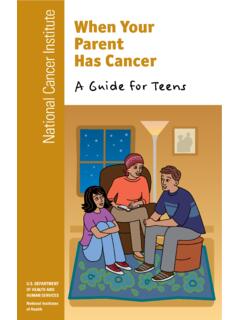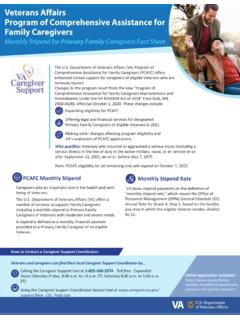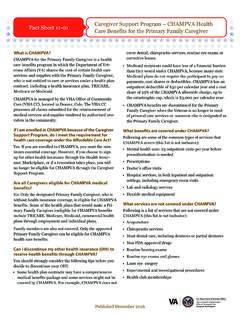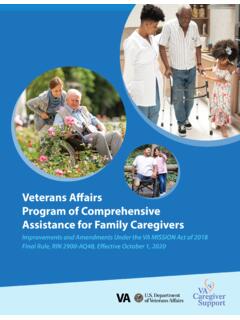Transcription of Support for Cancer Caregivers: Caring for the Caregiver
1 Support for Cancer CaregiversCaring for theCaregiverNational Cancer DEPARTMENT OF HEALTH AND HUMAN SERVICESN ational Institutes of HealthThe National Cancer Institute (NCI) booklet, When Someone You Love Is Being Treated for Cancer , contains more detailed information for caregivers . To view or print this booklet, go to our website at For more information call the NCI at 1-800-4- Cancer (1-800-422-6237). Caring for the Caregiver You need to learn ways to take care of yourself. Because if you re not taking care of yourself, you can t take care of anyone else.
2 Don t be afraid to ask questions. Don t be afraid to ask for help. JaneInside This BookletWho Is a Caregiver ? ..1 Your Feelings ..2 Asking for Help ..4 Caring for Yourself ..6 Going With Your Loved One to Medical Visits ..9 Talking With Others ..12 Remember ..151 Who Is a Caregiver ?Are you helping a loved one get through Cancer treatment? If you are, then this booklet is for you. You are a Caregiver . You may not think of yourself as a Caregiver . You may feel you are doing something natural. You are just Caring for someone you love.
3 Some caregivers are family members. Others are friends. What does giving care mean?Giving care can mean helping with daily needs. These include going to doctor visits, making meals, and picking up medicines. It can also mean helping your loved one cope with feelings. Like when he or she feels sad or angry. Sometimes having someone to talk to is what your loved one needs giving care, it s normal to put your own needs and feelings aside. But putting your needs aside for a long time is not good for your health. You need to take care of yourself, too.
4 If you don t, you may not be able to care for others. This is why you need to take good care of New Role Whether you re younger or older, you may find yourself in a new role as a Caregiver . You may have been part of someone s life before Cancer , but maybe now the way you Support that person is changing. For example, you may be taking care of your spouse who has always been healthy or an adult child taking care of your parent. Whatever your roles are now, it s normal to feel confused and stressed at this time. If caregiving feels new to you, try not to worry.
5 Many caregivers say that they learn more as they go through their loved one s Cancer treatment. And if you need to, try to share your feelings with friends, a counselor or a Support group. Many caregivers say that talking with others helped them. They feel they were able to say things that they couldn t always say to their loved FeelingsIt s common to feel stressed and overwhelmed at this time. Like your loved one, you may feel angry, sad, or worried. Try to share your feelings with others who can help you. It can help to talk about how you feel.
6 You could even talk to a counselor or social worker. Understanding your feelingsYou probably have many feelings as you take care of your loved one. There is no right way for you to feel. Each person is first step to understanding your feelings is to know that they re normal. Give yourself some time to think through them. Some feelings that may come and go are: Sadness. It s okay to feel sad. But if it lasts for more than 2 weeks, and it keepsyou from doing what you need to do, talk to your doctor. Anger. You may be angry at yourself or family members.
7 You may be angry atthe person you re Caring for. Know that anger often comes from fear, panic,or stress. Try to look at what is beneath the anger. Grief. You may be feeling a loss of what you value most. This may be your lovedone s health. Or it may be the loss of the day-to-day life you had before thecancer was found. Let yourself grieve these losses. Guilt. Feeling guilty is common, too. You may think you aren t helping you may feel guilty that you are healthy. Loneliness. You can feel lonely, even with lots of people around you.
8 You mayfeel that no one understands your problems. You may also be spending lesstime with may helpKnow that you are not alone. Other caregivers share these feelings. Talk with someone if your feelings get in the way of daily life. Maybe you have a family member, friend, priest, pastor, or spiritual leader to talk to. Your doctor or social worker may also be able to are some other things that may help you: Forgive yourself. Know that we all make mistakes whenever we have a lot on ourminds. No one is perfect, and chances are that you re doing what you can at thismoment.
9 Cry or express your feelings. You don t have to pretend to be cheerful. It s okay toshow that you are sad or upset. Focus on things that are worth your time and energy. Let small things go for example, don t fold clothes if you are tired. Don t take your loved one s anger personally. It s very common for people to directtheir feelings at those who are closest. Their stress, fears, and worries may come outas anger. Be hopeful. What you hope for may changeover time. But you can always hope forcomfort, joy, acceptance, and for Help Many people who were once caregivers say they did too much on their own.
10 Some wished that they had asked for help sooner. Accepting help from others isn t always easy. When tough things happen, many people tend to pull away. They think, We can handle this on our own. But things can get harder as the patient goes through treatment. As a result, many caregivers have said, There s just too much on my plate. Take a look at how busy you are now. Be honest with yourself about what you can do. Think about tasks you can give to others. And let go of tasks that aren t as important right for help also helps your loved t be afraid to ask for help.
















